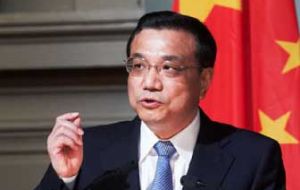MercoPress. South Atlantic News Agency
Confidence China is coming off its worst annual economic performance
 “We have confidence in fulfilling the targets set out for economic and social development” in 2013 said Chinese Premier Li
“We have confidence in fulfilling the targets set out for economic and social development” in 2013 said Chinese Premier Li China, a major driver of the global economy, is coming off its worst annual economic performance since 1999 after GDP managed an expansion of just 7.7% last year. Authorities, however, say weaker growth is in line with their desire to shift the country's economic growth model toward what they see as slower and more sustainable private-led demand rather than previously popular credit-fuelled state-driven investment projects.
The International Monetary Fund (IMF) has forecast that China's economy would grow 7.6% this year, while the World Bank said it expects the country to achieve the government's official target of 7.5%.
China's slowing growth “will affect many other economies, notably the commodity exporters among the emerging market and developing economies”, the Washington-based IMF said in its World Economic Outlook report.
Authorities' moves to rebalance the economy “may be accompanied by lower medium-term growth than achieved by China in recent decades”, the IMF said. Earlier this month, the government announced that Chinese manufacturing activity strengthened in September to its highest level in 17 months.
Meanwhile, a closely watched private survey of manufacturing released by British banking giant HSBC in late September for the same month showed a slight gain from August
Chinese Premier Li Keqiang said the nation’s economic growth probably exceeded 7.5% in the first nine months of the year, a sign the government will next week report success in arresting a two-quarter slowdown.
The economy has “shown stronger momentum of steady growth” in the past few months, with indicators that reflect market expectations such as the Purchasing Managers’ index improving, Li said. China previously reported expansion of 7.6% in the first half and Li’s government introduced measures including faster railway spending and tax cuts to defend a 7.5% goal for the full year.
“We have confidence in fulfilling the targets set out for economic and social development” in 2013, Li said.
However the latest Customs figures show and unexpected drop in exports which led to China's trade surplus narrowing to a disappointing 15.2 billion dollars in September from 28.6 billion in August.
Exports fell 0.3% year-on-year to 185.64 billion dollars last month, while imports increased 7.4% to 170.44 billion, the figures said. Statistics could signal a potential headwind for the world's second largest economy that relies heavily on global demand for its products.
Exports in August jumped 7.2% year-on-year to 190.7bn. The positive figures had led analysts to point to optimism in China's economy. However, the September trade result was worse than expected. Analysts say China's national holidays falling in September, along with a strong local currency, could have stalled exports.
China's Mid-Autumn Festival fell from September 19 to September 21 this year, while in 2012 the holiday ran from September 30 into October.
China's trade performance is a key element of the country's economic growth figures, the latest of which for the third quarter through September are due for release next Friday.




Top Comments
Disclaimer & comment rules-

-

Read all commentsChINDEC time again!
Oct 15th, 2013 - 04:08 pm 0They have just invested a cool 800 million at Airport City, Manchester Airport and a new route to Shenzen Province. The Chinese love Manchester.
Oct 15th, 2013 - 10:46 pm 0http://www.youtube.com/watch?v=Dhg5RVBidLk
http://www.youtube.com/watch?v=Dhg5RVBidLk
Commenting for this story is now closed.
If you have a Facebook account, become a fan and comment on our Facebook Page!